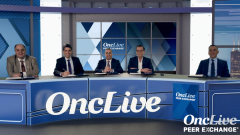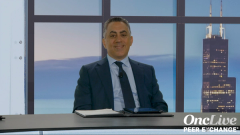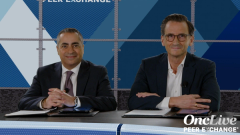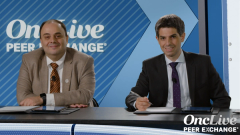
Early-Stage HCC: Role of Adjuvant Therapy
A brief discussion on the risks of neoadjuvant immunotherapy in early-/intermediate-stage HCC with regard for liver transplantation candidacy.
Episodes in this series

Transcript:
Tanios Bekaii-Saab, MD: Before we move on to potential neoadjuvant strategies, we're talking about patients who may have a potential opportunity at getting transplant. Any concern about this evolving landscape of integrating immunotherapy options in those patients who may potentially be on a transplant list or may need transplant with early recurrence? What are the concerns there?
Anthony El-Khoueiry, MD: It's an evolving area. I can tell you that in the United States, there are small institutional reports of patients having received immunotherapy downstaged and then received transplants. So these were patients who were not within transplant criteria, but received immunotherapy, had a response, and went to transplant. The time to transplant from the last immunotherapy has varied widely in these reports. Based on small reports now, it seems to be feasible. We still need multiinstitutional data, more structured data to identify the ideal time to transplant, but in this setting, if we use this as adjuvant treatment, likely the patient would not recur immediately. It would be several months or a year or 2. In that case, based on the half-lives of these agents, it should not be a concern.
Tanios Bekaii-Saab, MD: Arndt, Pierre, what are your thoughts? You deal on your end with those patients.
Arndt Vogel, MD: We have recently tried to summarize the data that has been published, and I completely agree that the data, I mean more single center with small numbers. Overall, you get the impression that around one-third of the patient, might develop severe rejections after transplantation, and they can be in 40% to 50% lethal. With severe liver rejection, it can turn out to be really bad. We have experienced a case like that. A patient on treatment received mono immunotherapy, got a transplant, and had a severe rejection, and it was impossible to get this rejection treated. We tried everything, but eventually, he died. Having this experience, I'm extremely cautious today, but I also understand that there are some reports in which it has been shown that you can do nivolumab until the day before transplantation without any rejection. We need more data, and it needs to be discussed in the team. I would also agree that a little bit of time between the last dose and transplantation would be extremely helpful. The question is how much? 3, 6 months? I don’t know.
Tanios Bekaii-Saab, MD: Pierre, where's your interval of comfort? What's that comfort zone?
Pierre Gholam, MD: I agree with everything that was said. The evidence is lacking at this point. The largest US evidence comes from the Mount Sinai group. They summarize their findings of patients who they had treated with various checkpoint inhibitors and then transplanted their conclusions based on a relatively small number. It said a 6-week wait time might be a reasonable timeframe beyond which acute cellular rejection is less likely to happen. Those conclusions are tentative. Clearly, if a patient has received a transplant and needs to receive IO [immunooncology] therapy for any solid organ transplant afterwards, we have definitive evidence that you should not do that. That's a bad idea.
Tanios Bekaii-Saab, MD: It is not a good idea.
Arndt Vogel, MD: You can think about it; maybe not as first-line. We have all seen these patients that progress on the TKIs [tyrosine kinase inhibitors] immediately. They have a good liver function in general, so they can tolerate a lot of chemotherapy, and at some point, you end up with FOLFOX [combination regimen] maybe, but then when you're desperate and the patient is still fit. We’ve had the discussions, and it's something to consider if there are no other options available, but still, the risk of rejection is clearly there and needs to be mentioned.
Tanios Bekaii-Saab, MD: I'd be a bit nervous. I can understand that it's ultimately a discussion, but I'd be very nervous.
Transcript edited for clarity.








































